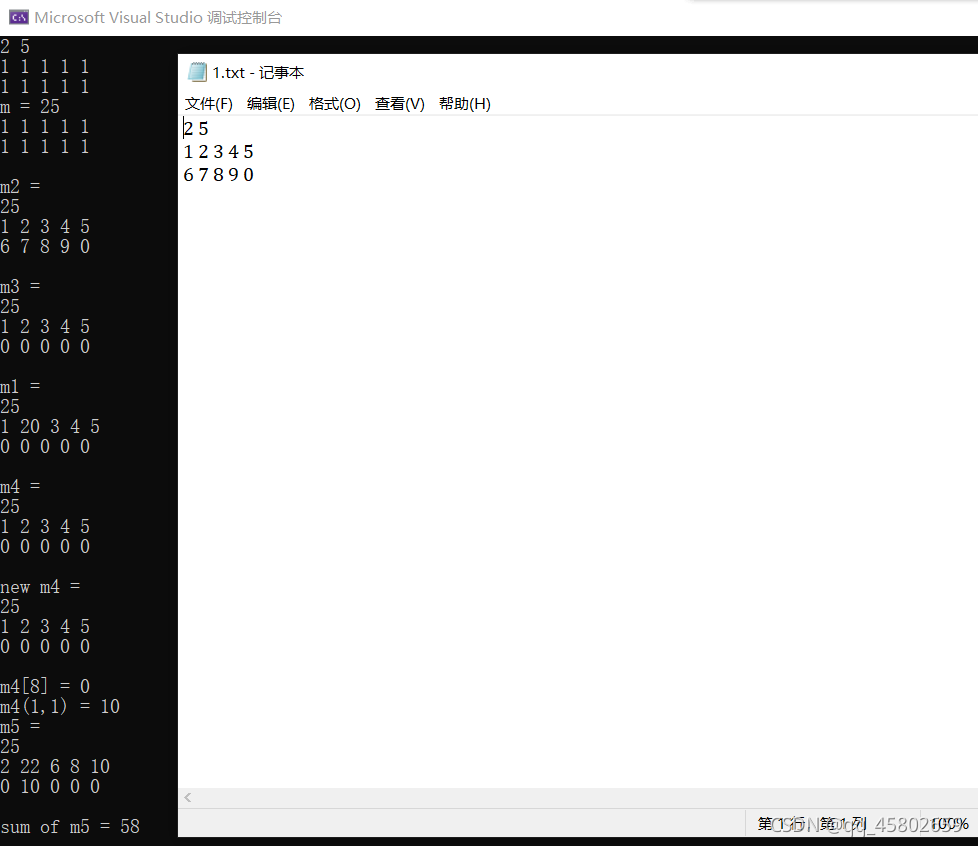CMatrix类设计
一、CMatrix类的代码实现
1. main.cpp
#include <iostream>
#include "CComplex.h"
#include <stdio.h>
#include "CMatrix.h"
using namespace std;
int main(int argc, char** argv) {
//初始化,调用CMatrix()
CMatrix m;
cin >> m;
cout << "m = " << m << endl;
double pData[10] = { 1,2,3,4,5 };
CMatrix m1(2, 5, pData);
CMatrix m2("1.txt");
cout << "m2 = \n" << m2 << endl;
CMatrix m3(m1);
CMatrix m4;
//指向等一个地方
m4 = m1;
//第0行第1列改为20
m1.Set(0, 1, 20);
//此处m1,m4相同
cout << "m3 = \n" << m3 << endl;
cout << "m1 = \n" << m1 << endl;
cout << "m4 = \n" << m4 << endl;
m4 = m4;
cout << "new m4 = \n" << m4 << endl;
//[]重载,[0,1]不允许带多个参数
cout << "m4[8] = " << m4[8] << endl;
//()重载,()允许带多个参数
m4(1, 1) = 10;
cout << "m4(1,1) = " << m4(1, 1) << endl;
if (m4 == m1) {
cout << "Error!" << endl;
}
//+重载
CMatrix m5;
m5 = m1 + m4;
cout << "m5 = \n" << m5 << endl;
//double重载
double d = m5;
cout << "sum of m5 = " << d << endl;
return 0;
}
2. CMatrix.h
#pragma once
#ifndef CMATRIX_H
#define CMATRIX_H
#include <iostream>
using namespace std;
class CMatrix {
public:
//不带参数的构造函数
CMatrix();
//如果nRow=0有默认值则之后的都得有默认值
//若都默认值为0,相当于无参数,则会与上一个构造函数CMatrix();产生歧义,不知道调用哪一个
//带行、列及数据指针等参数的构造函数, 并且参数带默认值
CMatrix(int nRow, int nCol, double* pData = NULL);
//拷贝构造函数
CMatrix(const CMatrix& m);
//带文件路径参数的构造函数
CMatrix(const char* strPath);
//析构函数名应与类名相同,只是在函数名前面加一个位取反符,以区别于构造函数。
//它不能带任何参数,也没有返回值(包括void类型)。由于没有函数参数,因此它不能被重载,只能有一个析构函数。
//如果用户没有编写析构函数,编译系统会自动生成一个缺省的析构函数(即使自定义了析构函数,编译器也总是会为我们合成一个析构函数,并且如果自定义了析构函数,编译器在执行时会先调用自定义的析构函数再调用合成的析构函数),它也不进行任何操作。所以许多简单的类中没有用显示的析构函数。
//当对象的生命周期结束时,撤销类对象时候会自动调用析构函数。
//1.对象在生命期结束,撤销类对象时会自动调用析构函数。
//2.如果用new运算动态地建立一个对象,那用delete运算符释放该对象时,才会调用析构函数。
~CMatrix();
bool Create(int nRow, int nCol, double* pData = NULL);
void Set(int nRow, int nCol, double dVal);
//隐式内联函数,不声明
//void CMatrix::Set(int nRow, int nCol, double dVal) {
// m_pData[nRow * m_nCol + nCol] = dVal;
//}
void Release();
//赋予特权,特殊声明,friend加了之后为全局函数不是成员函数,类里面定义的所有对象都可以调用,所以可以访问下面的private私有变量
//输出输入流运算符重载,原本输出输入流只能针对基础的数据类型,比如char,int,double,指针,重载后使其能够读取自己定义的类
friend istream& operator>>(istream& is, CMatrix& m);
friend ostream& operator<<(ostream& os, const CMatrix& m);
CMatrix& operator=(const CMatrix& m);
CMatrix& operator+=(const CMatrix& m);
// CMatrix& operator+(const CMatrix& m);
// CMatrix operator+(const CMatrix& m1,const CMatrix& m2);
double& operator[](int nIndex);
double& operator()(int nRow, int nCol);
bool operator ==(const CMatrix& m);
bool operator !=(const CMatrix& m);
operator double();
//不允许外部访问
private:
//行
int m_nRow;
//列
int m_nCol;
//存储地址
double* m_pData;
};
//全局函数
CMatrix operator+(const CMatrix& m1, const CMatrix& m2);
//显式内联函数,好处相当于直接把函数放过去没有调用函数,调用函数还需要出栈入栈
//十几行较多行的代码,递归,循环不建议写成内联函数
inline void CMatrix::Set(int nRow, int nCol, double dVal) {
m_pData[nRow * m_nCol + nCol] = dVal;
}
#endif // !CMATRIX_H
3. CMatrix.cpp
#include "CMatrix.h"
#include <fstream>
#include <assert.h>
//这种初始化方式提高效率,顺序与成员变量原来的顺序一样,可同时与下面的初始化方式共用
CMatrix::CMatrix() :m_nRow(0), m_nCol(0), m_pData(NULL){
//先申请空间完之后才赋值
//m_nRow = 0;
//m_nCol = 0;
//m_pData = NULL;
}
CMatrix::CMatrix(int nRow, int nCol, double* pData) : m_pData(NULL) {
//因为Create中有Release(),如果不初始化会因为不是NULL直接delete
Create(nRow, nCol, pData);
}
//拷贝构造函数
CMatrix::CMatrix(const CMatrix& m) : m_pData(NULL) {
*this = m;
}
//方法1:
//CMatrix::CMatrix(const CMatrix& m) : {
// m_nRow = 0;
// m_nCol = 0;
// m_pData = NULL;
// Create(m_nRow, m_nCol, m_pData);
//}
//方法2:构造该函数,用另一个构造函数去构造
//CMatrix::CMatrix(const CMatrix& m) : CMatrix(m.m_nRow,m.m_nCol,m.m_pData) {
//
//}
CMatrix::CMatrix(const char* strPath) {
m_pData = NULL;
m_nRow = m_nCol = 0;
ifstream is(strPath);
is >> *this;
}
CMatrix::~CMatrix() {
Release();
}
bool CMatrix::Create(int nRow, int nCol, double* pData) {
Release();
m_nRow = nRow;
m_nCol = nCol;
//新建空间存储数据
m_pData = new double[nRow * nCol];
//当nRow*nCol数据过大时,m_pData分配空间不足,此时m_pData就会为空
if (m_pData != NULL) {
if (pData!=NULL) {
//void *memcpy(void *destin, void *source, unsigned n);
//作用是:以source指向的地址为起点,将连续的n个字节数据,复制到以destin指向的地址为起点的内存中。
//函数有三个参数,第一个是目标地址,第二个是源地址,第三个是数据长度。
memcpy(m_pData, pData, nRow * nCol * sizeof(double));
}
}
else {
return false;
}
return true;
}
//delete之后赋值为空,delete指针之后只是释放了空间,指针依旧存在且指向原来的地址,此时对该指针的操作都将十分容易报错
void CMatrix::Release() {
if (m_pData!=NULL) {
delete []m_pData;
m_pData = NULL;
}
m_nRow = m_nCol = 0;
}
CMatrix& CMatrix::operator=(const CMatrix& m) {
//判断如果等号左右相同,直接返回,否则会是空,因为Create开头是Release
//等号运算符重载该有的判断
if (this != &m) {
Create(m.m_nRow, m.m_nCol, m.m_pData);
}
return *this;
}
CMatrix& CMatrix::operator+=(const CMatrix& m) {
assert(m_nRow == m.m_nRow && m_nCol == m.m_nCol);
for (int i = 0; i < m_nRow*m_nCol; i++){
m_pData[i] += m.m_pData[i];
}
return *this;
}
//全局函数
CMatrix operator+(const CMatrix& m1, const CMatrix& m2) {
CMatrix m3(m1);
m3 += m2;
return m3;
}
//可以写成内联函数
double& CMatrix ::operator[](int nIndex) {
assert(nIndex < m_nRow* m_nCol);
return m_pData[nIndex];
}
double& CMatrix ::operator()(int nRow,int nCol) {
assert(nRow*m_nCol+nCol < m_nRow* m_nCol);
return m_pData[nRow * m_nCol + nCol];
}
bool CMatrix::operator==(const CMatrix& m) {
if (!(m_nRow == m.m_nRow && m_nCol == m.m_nCol)) {
return false;
}
for (int i = 0; i < m_nRow * m_nCol; i++) {
if (m_pData[i] != m.m_pData[i]) {
return false;
}
}
return true;
}
bool CMatrix::operator!=(const CMatrix& m) {
return !((*this) == m);
}
//前面无double但是有返回值,因为这是强制类型转换,已经知道返回值就是double
CMatrix::operator double() {
double dS = 0;
for (int i = 0; i < m_nRow * m_nCol; i++) {
dS += m_pData[i];
}
return dS;
}
istream& operator>>(istream& is, CMatrix& m) {
//m.Release();后面Create开始就有 此处可以省略
is >> m.m_nRow >> m.m_nCol;
m.Create(m.m_nRow, m.m_nCol);
for (int i = 0; i < m.m_nRow*m.m_nCol; i++) {
is >> m.m_pData[i];
}
return is;
}
ostream& operator<<(ostream& os, const CMatrix& m) {
os << m.m_nRow << " " << m.m_nCol << endl;
double* pData = m.m_pData;
for (int i = 0; i < m.m_nRow; i++) {
for (int j = 0; j < m.m_nCol; j++) {
os << *pData++<<" ";
}
os << endl;
}
return os;
//上面的方法效率更高
//os << m.m_nRow << "" << m.m_nCol << endl;
//for (int i = 0; i < m.m_nRow; i++) {
// for (int j = 0; j < m.m_nCol; j++) {
// os << m.m_pData[i * m.m_nCol + j] << " ";
// }
// os << endl;
//}
//return os;
}
二、运行结果

三、函数
1. 构造函数
//不带参数的构造函数
CMatrix();
//如果nRow=0有默认值则之后的都得有默认值
//若都默认值为0,相当于无参数,则会与上一个构造函数CMatrix();产生歧义,不知道调用哪一个
//带行、列及数据指针等参数的构造函数, 并且参数带默认值
CMatrix(int nRow, int nCol, double* pData = NULL);
//拷贝构造函数
CMatrix(const CMatrix& m);
//带文件路径参数的构造函数
CMatrix(const char* strPath);
(1)分类
- 不带参数的构造函数
- 带有参数的构造函数
- 拷贝构造函数
- 带文件路径参数的构造函数
(2)特点
构造函数具有如下几个特点:
- 名字与类名相同,可以有参数,但是不能有返回值(void也不行);
- 作用是对对象进行初始化工作,如给成员变量赋值等;
- 如果定义类时没有写构造函数,系统会生成一个默认的无参构造函数,默认构造函数没有参数,不做任何工作;
- 如果定义了构造函数,系统不再生成默认的无参构造函数;
- 对象生成时构造函数自动调用,对象一旦生成,不能在其上再次执行构造函数
- 一个类可以有多个构造函数,为重载关系。
2. 析构函数
//析构函数名应与类名相同,只是在函数名前面加一个位取反符,以区别于构造函数。 //它不能带任何参数,也没有返回值(包括void类型)。由于没有函数参数,因此它不能被重载,只能有一个析构函数。 //如果用户没有编写析构函数,编译系统会自动生成一个缺省的析构函数(即使自定义了析构函数,编译器也总是会为我们合成一个析构函数,并且如果自定义了析构函数,编译器在执行时会先调用自定义的析构函数再调用合成的析构函数),它也不进行任何操作。所以许多简单的类中没有用显示的析构函数。 //当对象的生命周期结束时,撤销类对象时候会自动调用析构函数。 //1.对象在生命期结束,撤销类对象时会自动调用析构函数。 //2.如果用new运算动态地建立一个对象,那用delete运算符释放该对象时,才会调用析构函数。 ~CMatrix();- 格式:在类名前加上~;且与构造函数不同的是,析构函数从来没有参数。
- 作用:当对象的生命周期结束时,撤销类对象时候会自动调用析构函数。 1.对象在生命期结束,撤销类对象时会自动调用析构函数。 2.如果用new运算动态地建立一个对象,那用delete运算符释放该对象时,才会调用析构函数。
3. 运算符重载
CMatrix& operator=(const CMatrix& m); CMatrix& operator+=(const CMatrix& m); double& operator[](int nIndex); double& operator()(int nRow, int nCol); bool operator ==(const CMatrix& m); bool operator !=(const CMatrix& m);C++预定义中的运算符的操作对象只局限于基本的内置数据类型,但是对于我们自定义的类型(类)是没有办法操作的。但是大多时候我们需要对我们定义的类型进行类似的运算,这个时候就需要我们对这么运算符进行重新定义,赋予其新的功能,以满足自身的需求。
4. 友元函数
//赋予特权,特殊声明,friend加了之后为全局函数不是成员函数,类里面定义的所有对象都可以调用,所以可以访问下面的private私有变量 //输出输入流运算符重载,原本输出输入流只能针对基础的数据类型,比如char,int,double,指针,重载后使其能够读取自己定义的类 friend istream& operator>>(istream& is, CMatrix& m); friend ostream& operator<<(ostream& os, const CMatrix& m);在实现类之间数据共享时,减少系统开销,提高效率。
5. 内联函数
以牺牲代码段空间为代价,提高程序的运行时间的效率(入栈与出栈操作)。
(1)显示
- 放在类外
//显式内联函数,好处相当于直接把函数放过去没有调用函数,调用函数还需要出栈入栈 //十几行较多行的代码,递归,循环不建议写成内联函数 inline void CMatrix::Set(int nRow, int nCol, double dVal) { m_pData[nRow * m_nCol + nCol] = dVal; }(2)隐式
- 放在类内
void CMatrix::Set(int nRow, int nCol, double dVal) { m_pData[nRow * m_nCol + nCol] = dVal; }